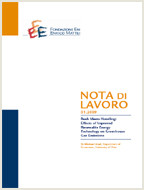Incentives for Price Manipulation in Emission Permit Markets with Stackelberg Competition

Data
03.02.2015
03.02.2015
Autori
Francisco J. André (Universidad Complutense de Madrid); Luis M. de Castro (Universidad Complutense de Madrid)
Codice JEL
D43, L13, Q58
D43, L13, Q58
Parole chiave:
Emissions Permits, Collusion, Market Power, Duopoly, Stackelberg Model
Emissions Permits, Collusion, Market Power, Duopoly, Stackelberg Model
Publisher
Climate Change and Sustainable Development
Climate Change and Sustainable Development
Editor
Carlo Carraro
Carlo Carraro
It has been shown in prior research that cost effectiveness in the competitive emissions permit market could be affected by tacit collusion or price manipulation when the corresponding polluting product market is oligopolistic. We analyze these cross market links using a Stackelberg model to show that under reasonable assumptions, there are no incentives to collude for lobbying prices up. However, incentives for manipulating the price of permits up appear if there is an initial free allocation of permits, which is a policy argument against grandfathering and in favor of auctioning. This effect is increasing with the amount of permits allocated to the leader. Moreover, the changes for price manipulation increase with those changes that tend to undermine the leader’s advantage in output production or to reduce the leader’s abatement cost.
***
Suggested citation: André, F. J., L. M. de Castro, (2015), ‘Incentives for Price Manipulation in Emission Permit Markets with Stackelberg Competition’, Nota di Lavoro 6.2015, Milan, Italy: Fondazione Eni Enrico Mattei.
